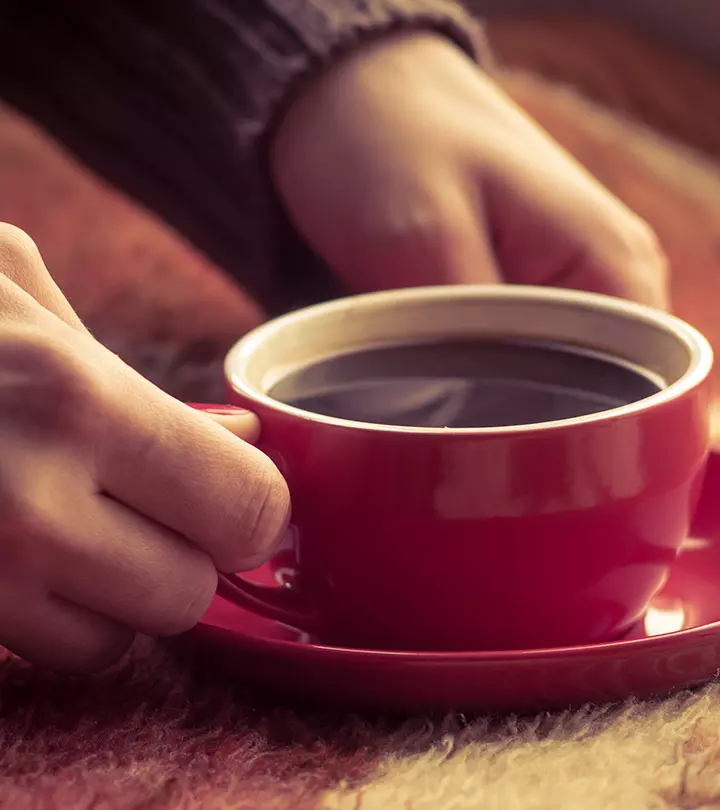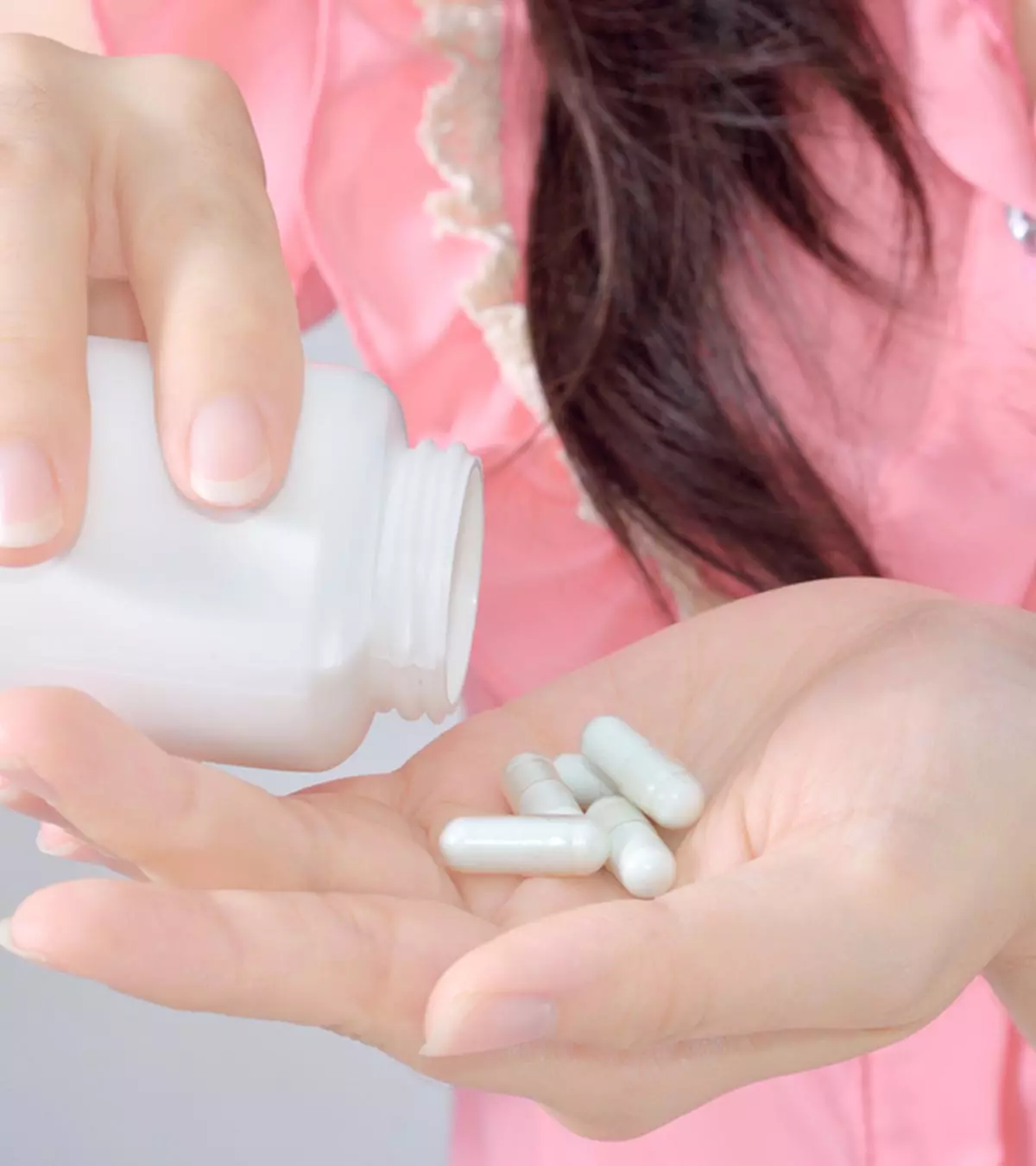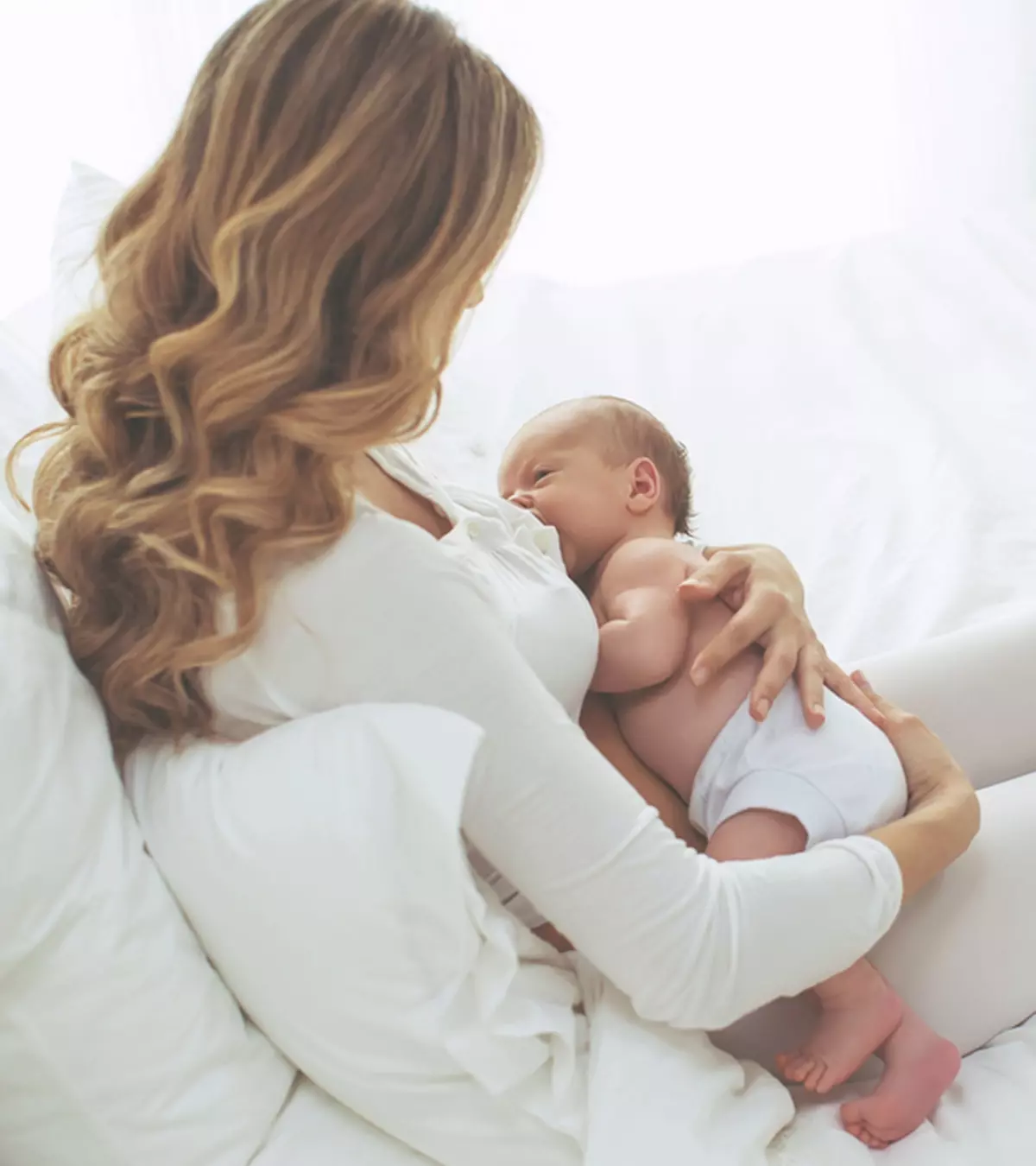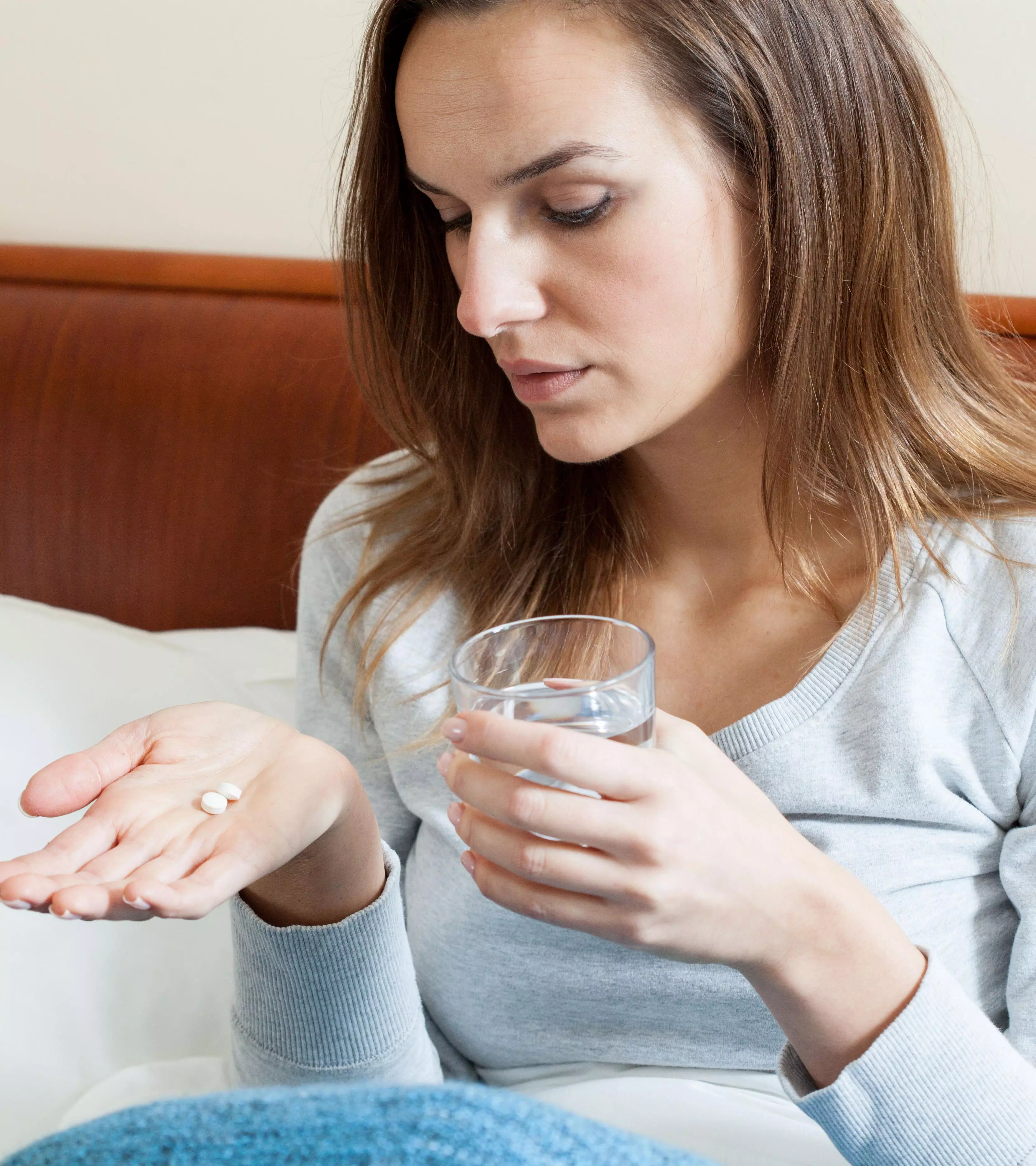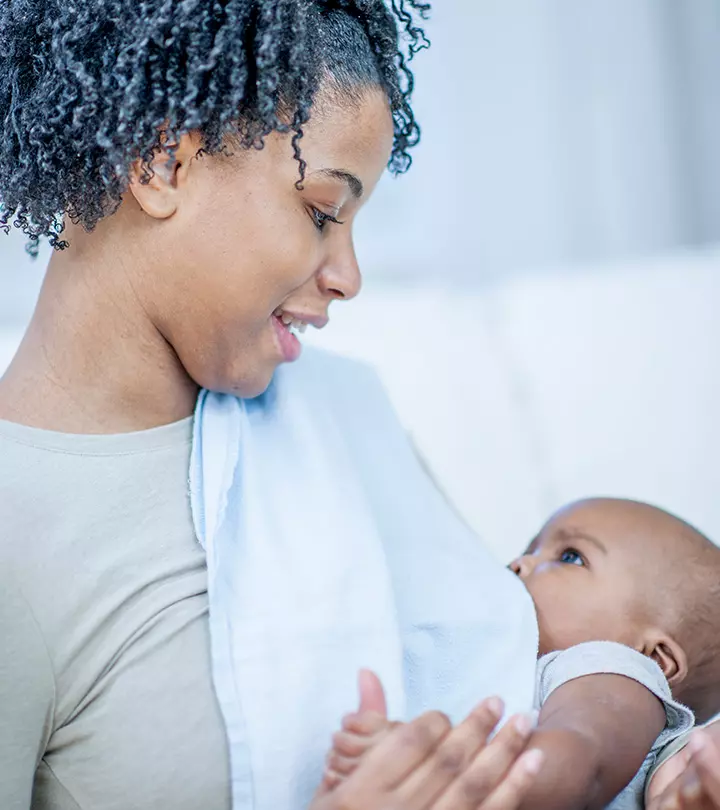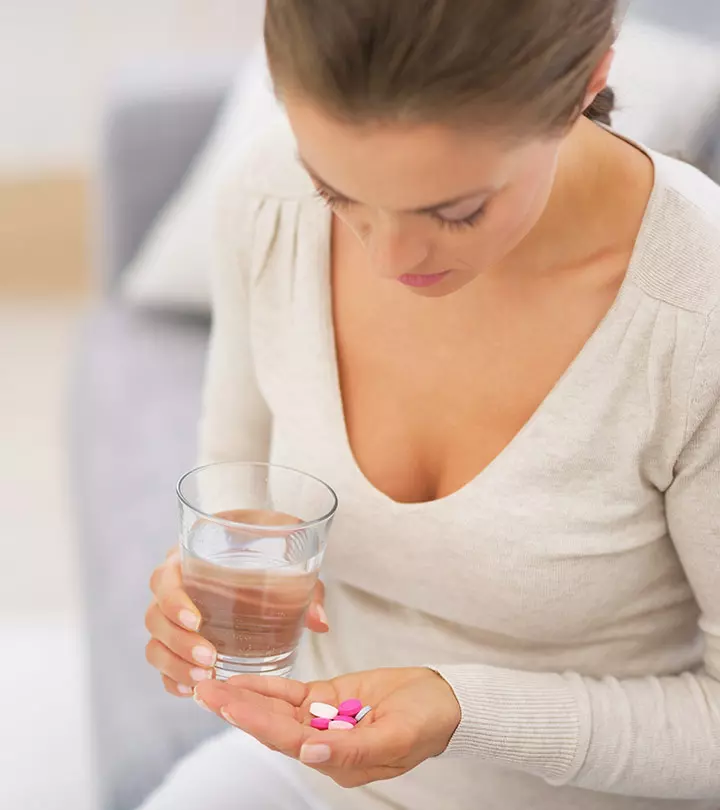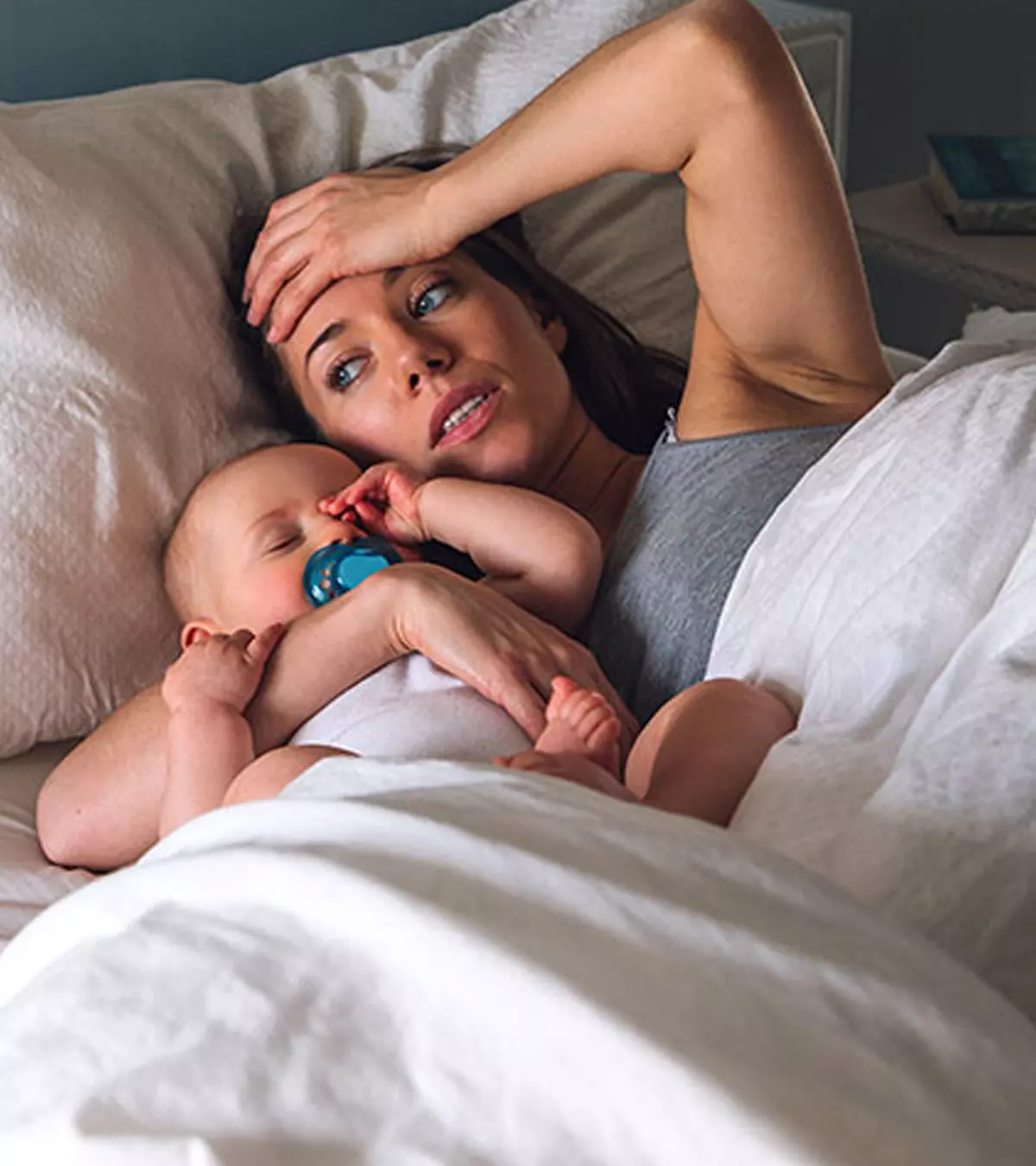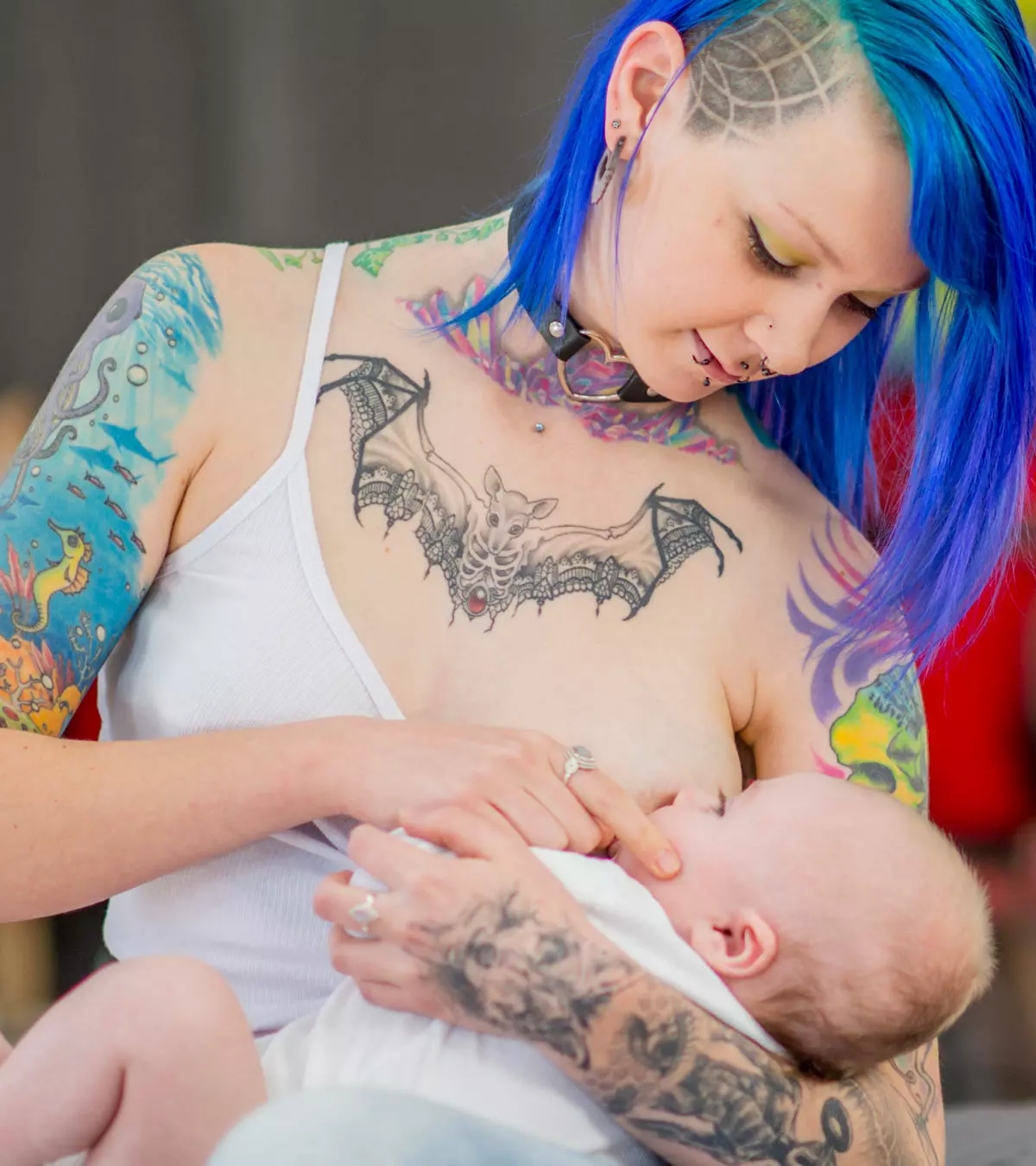
Image: iStock
Getting a body tattoo can be a unique way to etch your newborn’s memories on your body. However, you might want to know if it is safe to get a tattoo when breastfeeding. The American College of Nurse-Midwives (ACNM) and the American College of Obstetricians and Gynecologists (ACOG) do not discourage getting tattoos during breastfeeding.
However, some organizations advise against getting a tattoo when breastfeeding due to how tattooing is done. They also raise concerns about the risks of tattoo inks for nursing mothers and their babies. Hence, seeking expert guidance is vital for making informed decisions, especially in the early stages of motherhood.
Keep reading as we tell you more about how tattooing or body art is done, what inks are used for tattooing, the safety of tattooing during lactation and breastfeeding, and alternatives to tattooing.
Key Pointers
- While nursing, getting a tattoo may not be harmful, but the tattooing process may raise concerns.
- It is recommended to wait at least a year after delivery for the body to heal before getting a tattoo.
- To reduce the risk of health issues such as infections, allergic reactions, and scars, take necessary precautions while getting a tattoo.
- Research and choose a reputable and sanitary parlor, and follow the after-tattoo advice of the tattoo artist.
- If breastfeeding, avoid getting a tattoo on the chest, consider using natural products, or opt for a natural henna tattoo instead.
How Is Tattooing Done?
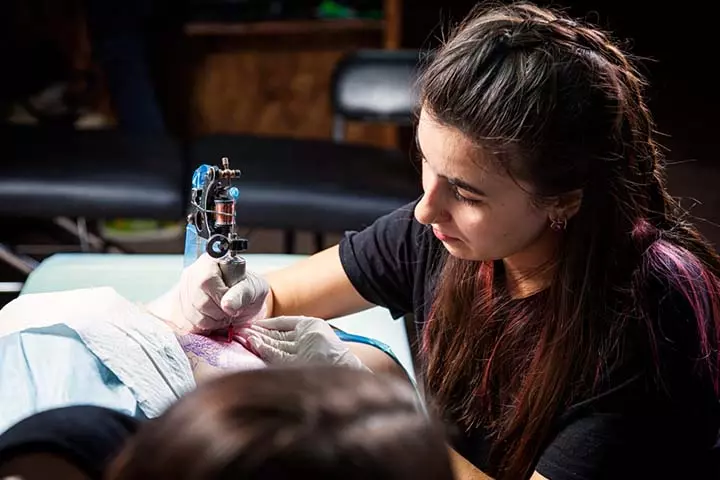
Image: Shutterstock
Before getting deeper into the discussion, let us give a look at the way tattoos are done.
- The process of permanent tattooing involves the use of handheld machines that have needles coated with ink.
- The ink is injected into your body in the dermal layer of your skin.
- The needle pierces you at a speed of hundred times per minute and has a depth of a few millimeters.
- Getting a tattoo done is not harmful, but the larger multi-colored ones are said to pose a threat compared to the black ones.
Are The Tattoo Inks Approved By The FDA?
The US Food and Drug Administration (FDA) has not approved any tattoo pigments, including those used for ultraviolet (UV) and glow-in-the-dark tattoos, for use on or under the skin. Most pigments used in tattoo inks are industrial-grade colors, suitable for automobile paint or printers’ ink.
The FDA has not even approved the use of henna in temporary tattoos. In fact, henna is approved only as a hair dye.
Is It Safe To Get A Tattoo While Breastfeeding?
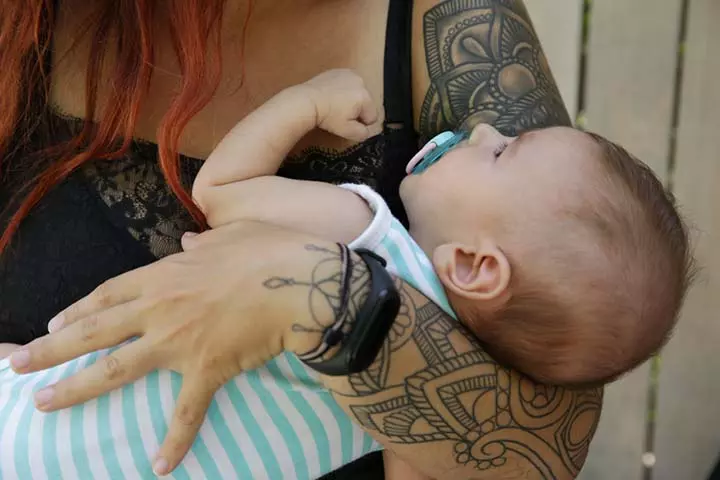
Image: Shutterstock
It is not unsafe to have tattoos during the lactation phase. The molecular structure of the ink is too large to pass into the breast milk. However, waiting sufficient time after delivery to get a tattoo is generally advisable.
 Point to consider
Point to considerWhat Are The Risks Associated With Tattooing While Nursing?
The risks factors are the same if breastfeeding or not. It is always better to be informed about the common risk factors associated with tattooing before going for it. Here are a few associated medical risks:
1. Infections
Systemic infections and local infections are the main concerns. Systemic infections occur when precautions are not taken by the tattoo artist or the tattoo parlor. The infections can include hepatitis, tetanus, and HIV.
Research says that there is a possibility of contracting infections such as HBV, HCV, and Syphilis while getting a tattoo done. A few of these infections may not pass through the breast milk to enter the baby. But, there is a risk if your nipples are cracked and are bleeding.
Local infections become acute when you do not attend the follow-up sessions after the first treatment or follow the recommended after-care regimen.
Note: Human milk banks do not accept breast milk from a lactating woman who has got a tattoo done in the past 12 months due to the potential risk of needle contamination with Hepatitis C.
2. Allergy

Image: Shutterstock
A few people may show allergic reactions to the tattoo ink thereby disrupting breastfeeding.
3. Scars /bumps
An unwanted scar may result from the removal or application of a tattoo (1). Sometimes tattooing leads to granulomas, which are small bumps or knots formed around the foreign material perceived by the body i.e. tattoo pigment particles.
4. MIR complications
MIR complications arise due to magnetic resonance imaging (MRI). They include burning or swelling in the prone areas. However, these complications are rare and do not last long.
Although the above-mentioned factors do not affect the safety or the quality of breast milk, they may impair your ability to breastfeed. The trauma of getting the tattoo done may reduce the milk supply too. However, there is no concrete evidence to support it.
So, is it possible to keep these risk factors at bay and go ahead with tattooing?
Safety Measures To Minimize The Risks Associated With Tattoo
Take safety measures before getting a tattoo while nursing. Here is what you should care about:
1. Do research
Do not blindly follow your friend who recently got a beautiful tattoo done. Make sure to visit a registered practitioner and the tattoo artist is using new needles, sterilized equipment, and gloves. Find out the best and the right places. You may talk to several acquaintances, who got tattooed previously.
2. Check the ambiance
See whether the tattoo makers are using gloves and new containers for the procedure. It is important to check if they are thoroughly washing their hands before inking. See if all the equipment is sterilized and the used equipment, such as the ink gun, is placed at a safe and sterile place.
Choose a hygienic tattoo parlor. Check with the local health department for local laws and regulations.
Professional tattooists follow universal precautions like:
- Sterilizing the machines with an autoclave.
- Bagging the equipment to avoid cross contamination.
- Single-use of ink cups, inks, needles, and gloves.
- Washing hands thoroughly with sanitizer.
3. Follow after-tattoo guidelines
Follow all the instructions given by your tattooist, both before and after tattooing, to avoid infections. They mostly are:
- Keeping the tattoo clean by using water and a mild soap.
- Not picking at the scabs.
- Protecting the tattooed region from exposure to the sun rays.
- Good skin care. The more you care, the more you avoid infections.
- Avoid alcohol while the tattoo is in the process of healing.
Should You Inform The Tattoo Artist That You’re Breastfeeding?
It is essential to inform the tattoo artist if you are breastfeeding. They should be aware of your breastfeeding status so they can take proper hygiene and safety measures, including using sterilized equipment and single-use inks. Although ink molecules are too large to be passed into breast milk during the tattoo process, tattooing has potential local or systemic infections. Some tattoo artists may choose not to work on pregnant or breastfeeding individuals due to health concerns. Reputable artists usually have a waiver for clients to sign regarding pregnancy and breastfeeding (2).
Is It Safe to Get A Tattoo Removed While Breastfeeding?
Removal of a tattoo requires laser treatment. The lasers emit energy leading to the fragmentation of the tattoo pigment. The fragments are then filtered out of the body through the immune system. The process is associated with minimal side effects and does not involve any blood spill. You just have to take care about laser tattoo removal while breastfeeding like you do when having a tattoo.
 Point to ponder
Point to ponderAlternatives For Tattooing
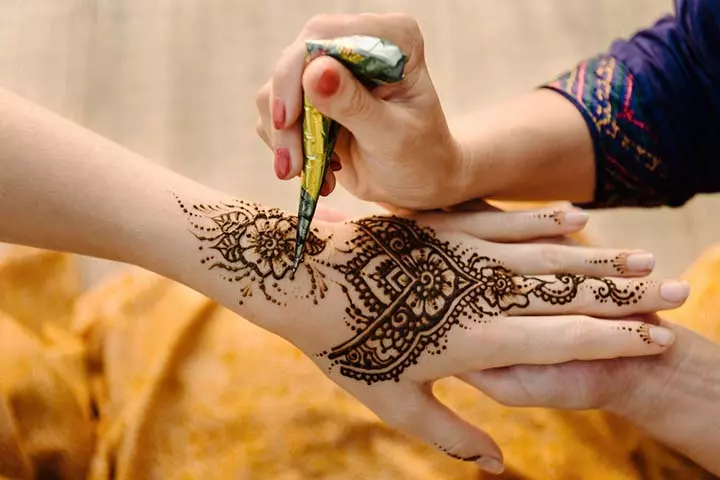
Image: Shutterstock
Since cosmetic tattooing is associated with infections, you can try out some safer options like the henna tattoo, when breastfeeding. Henna is a natural product that has been traditionally used to create contemporary designs. You can go for it. But, use pure ones which are orange, brown or red in colors. Remember, natural henna is not available in black.
Tips For Tattooing While Breastfeeding
Cannot resist the urge of getting a tattoo during breastfeeding? Not a problem. Follow these tips:
- Avoid getting tattoos done on the chest or breasts as it may not be possible to take care of the tattoo in those areas while nursing.
- Use natural products as they are safer. The severity of the artificial colors is unpredictable.
- Existing tattoos wouldn’t create a problem unless they were done in unsanitary conditions. To be sure, get yourself tested for infections.
- Make sure to screen the tattooist and the shop, before getting it done. Ask the artist to be extra careful.
Frequently Asked Questions
1. Can a tattoo artist use numbing cream if I am breastfeeding?
A tattoo artist can safely use numbing cream containing lidocaine for women in lactation. Lidocaine is unlikely to pass into breast milk in amounts that could harm your baby (3).
2. Can I breastfeed during the tattooing process?
It’s not advisable to breastfeed while getting a tattoo due to possible discomfort and pain that could affect your baby’s feeding.
3. Can I get a tattoo if I have cracked or bleeding nipples from breastfeeding?
Avoid getting a tattoo if you have cracked or bleeding nipples due to breastfeeding. Tattooing on damaged skin heightens the risk of infection and delays healing. Wait until your nipples heal before getting a tattoo to prevent complications.
The safety of tattoos is dependent on the hygiene protocols maintained at the parlor. Even for a normal individual, tattoos may increase the risk of infections and allergies. Considering that you are a nursing mother, these risks may affect your milk supply. However, getting a tattoo is a matter of personal preference. Hence, discuss with your medical professional if you can get a tattoo while breastfeeding. Consult your doctor after performing research on the tattoo parlor, and take your decision after analyzing all the pros and cons.
Infographic: Reactions To Tattoos
If you are a nursing mother, it is essential to note that tattooing could expose you and your baby to several infections and problems. Hence, being aware of these issues can help you seek prompt medical attention. Reading through this infographic that sheds light on the possible skin reactions to tattoos can help. Illustration: Momjunction Design Team
Illustration: Is It Safe To Have Tattoos When Breastfeeding? Risk & Tips

Image: Dall·E/MomJunction Design Team
References
- Think Before You Ink: Are Tattoos Safe?
http://www.fda.gov/consumers/consumer-updates/think-you-ink-tattoo-safety - Tattoos and Breastfeeding.
https://llli.org/breastfeeding-info/tattoos-and-breastfeeding/ - Pregnancy breastfeeding and fertility while using lidocaine skin cream – NHS
https://www.nhs.uk/medicines/lidocaine-skin-cream/pregnancy-breastfeeding-and-fertility-while-using-lidocaine-skin-cream/
Community Experiences
Join the conversation and become a part of our nurturing community! Share your stories, experiences, and insights to connect with fellow parents.
Read full bio of Briana Violand
Read full bio of shreeja pillai
Read full bio of Rohit Garoo
Read full bio of Shinta Liz Sunny






